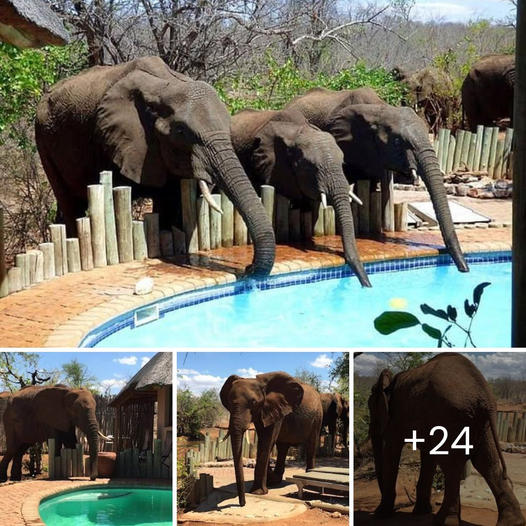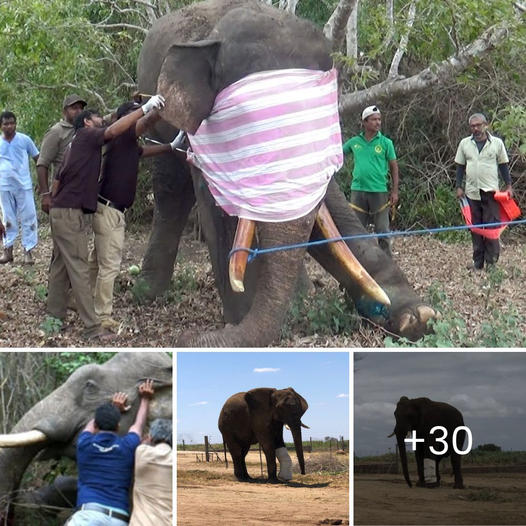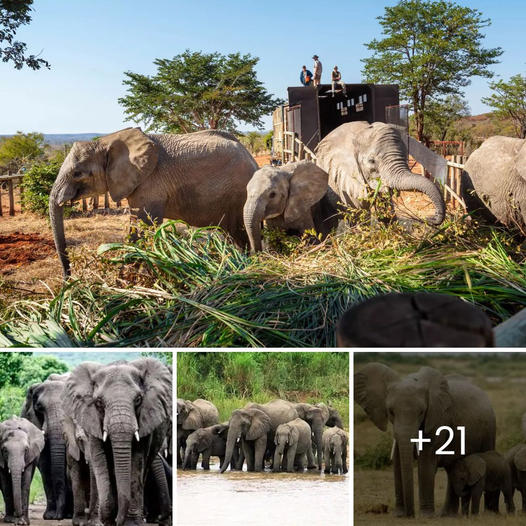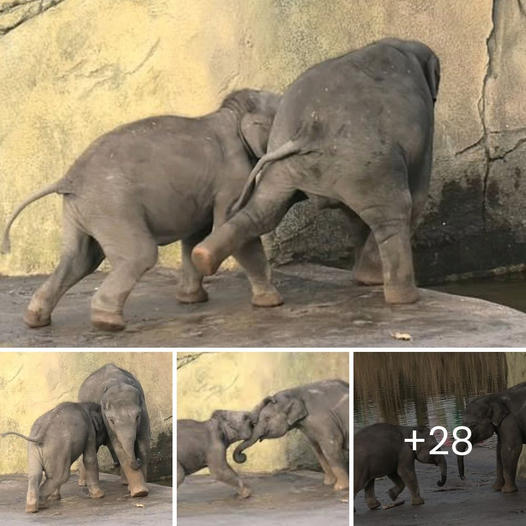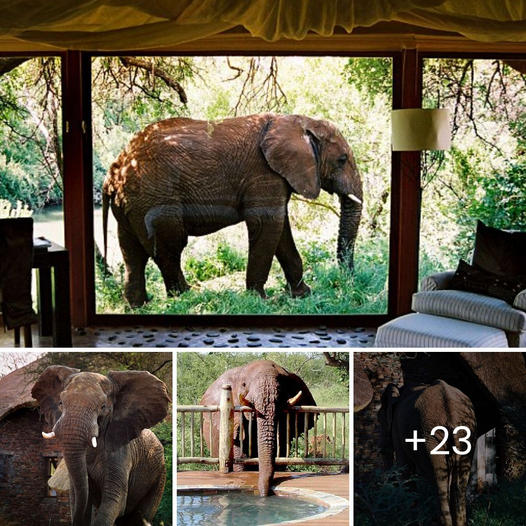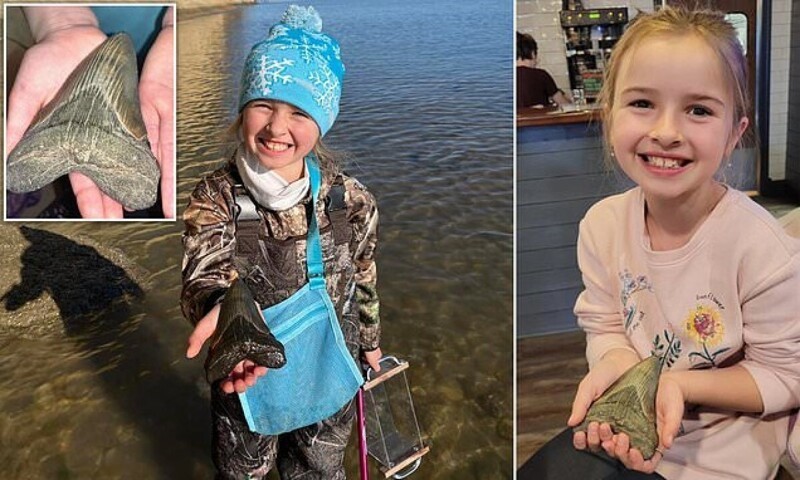In a crowded tourist park south of Chiang Mai in Thailand’s north, a 𝑏𝑎𝑏𝑦 elephant wanders around desolately surrounded by gawking crowds.
It’s the dry season and, in the unshaded and arid arena, temperatures have soared to well over 35C.
Deafening music is blasting out of speakers as one adult elephant is forced to play the harmonica. Another, bound by heavy chains, uses its trunk to throw darts at balloons.
Scroll down for video

At a crowded tourist park south of Chiang Mai in Thailand’s north, a 𝑏𝑎𝑏𝑦 elephant seeks comfort from its mother after a long day of being ridden by tourists in an unshaded and arid arena where temperatures soared to well over 35C

Elephant minders known as ‘mahouts’ are always by their side, threatening them with bull hooks if they dare to put a foot wrong

The mahouts’ bullhooks are long, sharp instruments which are used to stab the animals behind their ears – where any wounds will be well hidden from the paying public

Elephants are forced to sit and spin hula hoops in front of tourists, the ropes around their necks visible

In northern Thailand elephants were once used to haul teak for the prosperous logging industry, but now are held in captivity and forced to sit and spin hula hoops in front of tourists
The elephants’ minders, or ‘mahouts’, are always by their side, threatening them with bull hooks if they dare to put a foot wrong.
These are long, sharp instruments used to stab the animals behind the ears where any wounds will be well hidden from the paying public.
It makes for very difficult viewing for anyone who has spent time at elephant sanctuaries such as Elephant Valley Thailand which rehabilitates those pachyderms formerly used as tourist attractions.
‘There is no such thing as a domesticated elephant,’ founder Jack Highwood tells us.
‘There are only elephants who have lost their will to fight back.’
In northern Thailand elephants were once used to haul teak for the prosperous logging industry

Among the shows put on at the tourist parks are elephant massages, where mahouts supervise while the giant animals ‘lightly’ tap their feet on top of tourists’ bodies

The metal poles of a sedan chair dig into an elephant’s back as its tourist passenger sits oblivious on top of the captive beast

Elephants are tied to short chains, beaten with bull hooks and other sharp implements and underfed in order to make them behave. Here an animal is forced to bow for tourists
INSIDE THAILAND’S ELEPHANT ENTERTAINMENT INDUSTRY
Every year 12.8 million tourists travel to Thailand with the specific intention of interacting with elephants as part of their trip, according to a survey from World Animal Protection.
There are believed to be at least 3,000 elephants used in entertainment tourism throughout Asia for – with 77 per cent living in cruel and inadequate conditions, the organisation claims.
Most tourists believe the elephants have been domesticated ethically, but in fact most are captured from their herds in the wild or seized from their mothers when they are only babies.
But when machinery was developed to do this job instead, locals looked to put their animals to a different use.
Elephants became a major attraction and now 12.8 million tourists a year travel to Thailand to ride, wash and take selfies with elephants.
The life of a ‘domesticated’ elephant begins with a process called ‘crushing’ that is every bit as unpleasant as it sounds.
Animals are tied to short chains, beaten with bull hooks and other sharp implements and underfed in order to make them behave. This continues for the rest of their lives in captivity.
We are told one rescued elephant, Karmoon was chained to the side of the road for five years.
Bus loads of tourists would stop sometimes more than ten times a day, paying to wash Karmoon, who was often beaten and starved so she would be obedient.
Karmoon developed a trait common among domesticated elephants, a swaying of her head which can be misconstrued as playfulness.
It’s actually a coping mechanism whereby the elephant moves its head back and forth so that its brain smashes against its skull, releasing dopamine.

A distressed elephant tries to remove its tether after it was tied to the ground for not behaving during a performance at a tourist park. Elephants are herd animals and isolating them causes them to become depressed

A dust-covered elephant is chained to a concrete pylon at a tourist park in Chang Rai, with little more then a foot of room to move

Domesticated elephants often sway their heads, which can be misconstrued as playfulness. It’s actually a coping mechanism whereby the elephant moves its head back and forth so that its brain smashes against its skull, releasing dopamine. Here an elephant swings a golf club for tourists

An elephant swings a golf club as it performs for tourists, the swinging movement of their heads that the elephants develop is a coping mechanism for the stress of captivity

An elephant is forced to paint a picture for tourists as part of a show where the animals perform tricks, as a mahout with a bullhook looks on
Elephants are herd animals and isolating them causes them to become distressed and depressed.
At the Elephant Valley, Thailand, these gentle giants have minimal interaction with humans.
They are free to constantly graze at their leisure and are only fed by tourists once a day. Otherwise, they are left to roam and interact with each other as they would in the wild.
Rehabilitation is a long and difficult process but the difference in these animals compared to those in the tourist park is stark.

Rehabilitation for elephants raised in captivity is a long and difficult process, but the difference in these animals compared to those in the tourist park is stark. Here a 𝑏𝑎𝑏𝑦 elephant reaches out, searching for food at a tourist park

An elephant is forced to play a harmonica as it performs for tourists, a rope around its neck a reminder of its captive status

An elephant gets a chair strapped to its back early in the morning, ready for a long day ahead of being ridden by tourists

Baby elephants often sell for up to four times as much as an adult elephant because they draw larger crowds. This 𝑏𝑎𝑏𝑦 is looking around for food

An elephant prepares to throw a dart at balloons, one of the tricks the elephant has been forced to learn to amuse tourists

After performing the elephants line up to be fed by tourists for their work, but not even the prospect of food is enough to cheer up the depresses animals, their trunks drooping limply onto the ground
Here, they seem at peace, while those used for ‘entertainment’ look desperate and frantic.
Jack tells us that 𝑏𝑎𝑏𝑦 elephants often sell for up to four times as much as an adult elephant because they draw larger crowds.
It is desperately heart-breaking watching this youngster roam around a dusty arena knowing that he would otherwise be with his mother and the rest of his herd were it not for human intervention.

Currently under development, ChangChill elephant sanctuary outside of Chiang Mai cares for six elephants which are free to roam the surrounding hills and forest

That’s the spot – an elephant scratches itself on a tree at ChangChill elephant sanctuary, where it lives with five other animals

Carers at ChangChill elephant sanctuary – visitors can take part in feeding the elephants who live on the ChangChill’s eight acres

Elephants are free to roam the expansive sanctuary and graze on the trees, and the mahouts who work there share their passion with visitors

ChangChill includes both forested and landscaped areas for the six resident elephants to roam, eat and bathe in peace and safety

The carers at Chang Chill are trying to stop the cruel practice of keeping the elephants in captivity for entertainment

An elephant freely wanders through the scrub at ChangChill. The sanctuary was originally a tourist site offering elephant rides, but they were discontinued
Sanctuaries like Elephant Valley Thailand are future proofing the elephant industry in Thailand.
They allow tourists to interact with elephants while letting them exist in a more natural environment.
But until the practice of using elephants for entertainment stops completely they will continue to suffer abuse to boost Thailand’s lucrative tourism industry.

Elephants gather to be washed by mahouts at another sanctuary, Elephant Valley in Chiang Rai, which covered 40 lush acres

Tourists are allowed to feed the elephants at Elephant Valley Thailand once a day, and in contrast to the elephants held in captivity they appear happy at feeding time

Tourists watch on as elephants gather to be washed by mahouts at Elephant Valley, which claims to be the first ever elephant sanctuary in Thailand

Tourists are allowed to feed the elephants at Elephant Valley Thailand once a day, and a visit provides a look at the animals’ daily routine

An elephant drinks from a hose at a watering station at Elephant Valley. The herd spends 90 per cent of its time a safe distance from humans, eating quietly
Romayne and Jenny from London were visiting Elephant Valley Thailand with their family.
Before coming to Thailand they researched the most responsible way to interact with elephants on their holiday.
They chose the sanctuary because ‘it’s horrible and very distressing to see elephants in chains and carrying people’.
To find out more about Elephant Valley Thailand visit the website: www.elephantvalleys.com
Daily Mail Australia travelled as part of an awareness run by World Animal Protection to better protect elephants in captivity

Carers at Elephant Valley use targeted training to inspect the feet of their elephants for health problems such as abscesses

Elephants gather to be washed by mahouts at Elephant Valley, where no riding is allowed and animals are not forced to perform tricks

An elephant happily flaps its ears as it playfully enjoys being washed by one of the mahouts at the sanctuary in Chiang Rai

An elephant at Elephant Valley Thailand dusts itself in the afternoon sun. Resident animals consume 720kg a day, including 8kg of bananas
Post Views: 157
